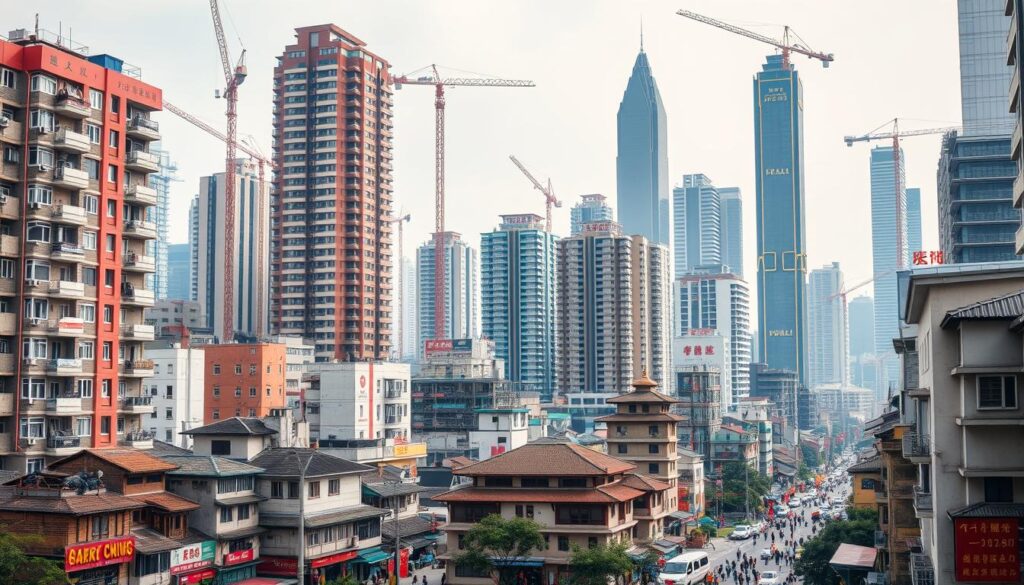The China Housing Market has seen big changes in house prices per square meter. This shows how economy and city growth affect prices. By July 2025, the average house price got to about 9,848.834 RMB/sq m, going up from before1. This means houses in China, especially in big cities, are still very expensive because a lot of people want them.
Take an 80 square meter home in Shanghai’s inner area. It would cost about $886,000. But, if you look outside big cities, you can find homes for $200,0002. In Beijing, a similar home costs about $310,0002. So, living in popular areas is getting harder to afford. Over 90% of Chinese families own their home2. And, more than 20% have more than one property2.
Lots of people wanting homes makes prices go up. This is also because of higher land costs, more money people make, and steady economy growth. Buying a home is getting tough for many. But, there are still chances to invest, even with market ups and downs. For a deep look into China’s house prices, check out this detailed analysis.
Key Takeaways
- Average property price in China as of July 2025 is 9,848.834 RMB/sq m.
- High demand for housing persists in Tier 1 cities like Shanghai and Beijing.
- An 80 square meter apartment in Shanghai’s Inner Ring is priced at approximately $886,000.
- Over 90% of families in China own their homes.
- Housing affordability continues to be a pressing issue for urban dwellers.
- Urban incomes have shown an annual increase of 13% over the past decade.
Contact us if you are Interested in Buying Property Abroad!
Introduction to the China Housing Market

The China Housing Market is vital to the economy, showing fast city growth and economic health. It is the biggest building market globally, adding over 2 billion square meters of space each year. This is almost half of the world’s total construction3. Around half of this is for city homes, and the rest is for rural areas3.
Looking back, the housing market has changed a lot. From 1978 to 2007, city residents’ living space quadrupled. It went from 6.7 to 28.3 square meters. Rural living space also tripled, reaching about 29 square meters3. This growth has put China’s living space per person higher than Japan and Europe.
Today, the Chinese property market is changing, raising concerns about home affordability. Housing prices have been soaring faster than people’s earnings. This has made buying a home harder for many3. To help, the government has increased mortgage rates and down payment needs3.
With urban migration, about 15 million people move to cities every year. This raises the demand for homes even more3. The aging population, mostly in rural areas, also affects housing. It needs special homes for the elderly and leads to smaller family sizes3. Knowing these trends is crucial for anyone interested in the Chinese property market.
For deeper insights into the China Housing Market and its impact, check out a detailed analysis here.
Trends in Property Prices in China

Property prices in China have seen big changes, especially in big cities. Prices in Tier 1 cities have shot up, often doubling in a few years. This is due to a growing middle class willing to invest in homes, despite high prices.
Historical Growth of Average House Prices
From 1998 to 2022, the cost of homes in China hit new highs. In cities like Beijing and Shanghai, prices went up twelve times. This increase shows how valuable real estate has become and reflects China’s growing economy. Yet, this rapid rise has led to ups and downs, raising questions about future growth.
Recent Fluctuations in Market Prices
Recently, China’s housing market has seen big changes. In top-tier cities, new home prices fell by 0.7% from April to May and dropped 3.2% from last year4. The government is working to stop a housing bubble by introducing measures like lower down payments for first-time buyers. They hope to make the market more stable4.
Also, fewer people are buying homes, raising worries about the economy5. But, sales of second-hand homes are bouncing back in some places. For example, in Shenzhen, sales grew over 40% year-on-year in May4. This shows that, despite challenges, some parts of the market are starting to stabilize.
Regional Disparities in Average House Prices

The regional disparities in average house prices across China highlight different levels of economic growth and city life. Tier 1 cities like Beijing, Shanghai, and Shenzhen have much higher house prices than Tier 2 and Tier 3 cities. Recognizing these differences helps us understand what influences the housing market.
Comparison of Tier 1, Tier 2, and Tier 3 Cities
In China, the housing market varies greatly between city tiers. For example, housing prices in Tier 1 cities can reach up to 70,000 yuan per square meter. On the other hand, Tier 2 cities like Xi’an have more affordable prices, around 15,000 yuan per square meter. This shows how the economy is stronger in larger cities, overshadowing slower growth in smaller areas.
Notable City Prices: Beijing, Shanghai, and Shenzhen
In early 2022, housing prices in Beijing, Shanghai, and Shenzhen showed their economic importance. Beijing’s average was about 46,941 yuan per square meter, Shanghai’s was near 66,801 yuan. Shenzhen’s prices were the highest, around 71,209 yuan, making it a top choice for investors. The high real estate investment in these cities points to strong urbanization and economic activities influencing housing prices6.
| City | Average Price (Yuan per Square Meter) | Tier |
|---|---|---|
| Beijing | 46,941 | Tier 1 |
| Shanghai | 66,801 | Tier 1 |
| Shenzhen | 71,209 | Tier 1 |
| Xi’an | 15,000 | Tier 2 |
Contact us if you are Interested in Buying Property Abroad!
Factors Influencing the Housing Market in China

Various factors shape the housing market in China, impacting prices and property trends. Knowing these factors helps us understand the complex real estate market there.
Supply and Demand Dynamics
Supply and demand strongly influence housing prices in China. The growing demand from cities often outpaces supply, especially in major cities. As urbanization increased from 17.92% in 1978 to 64.72% in 2021, competition for housing led to higher prices and more demand for real estate7.
Economic factors like GDP growth also affect housing prices, along with income and interest rates8. The average sales price of commercial housing skyrocketed from 2,112 yuan per m² in 2000 to 9,860 yuan per m² in 2020, straining supply systems7.
Government Policies and Economic Influences
Government policies play a big role in shaping the housing market. They control land supply and investment, significantly impacting prices. Moving towards privatization has increased property demand. Policies like the two-child policy also influence market trends9.
The real estate sector’s growth, from 4.38% of GDP in 2002 to 6.78% in 2021, shows its importance in the housing market7. Financing from shadow banking, which was about 20% of all loans from 2013-2015, adds another layer of complexity8.
| Influence Factor | Impact on Housing Prices |
|---|---|
| Urbanization Rate | Increases demand leading to higher property prices |
| Government Policies | Regulation impacts land supply and buyer incentives |
| Economic Growth (GDP) | Stronger economy often correlates with price increases |
| Interest Rates | Lower rates generally encourage real estate purchases |
| Shadow Banking | Increases credit availability, affecting demand levels |
The interaction of these elements shows the complex nature of China’s housing market. Different aspects together affect real estate values and affordability879.
Conclusion
The future of China’s housing market is uncertain, influenced by the economy and government rules. This market is the biggest in the world, worth about $60 trillion. It adds a lot, 17 to 29 percent, to China’s GDP1011. As more new homes are sold and old home prices go down, the outlook seems a bit hopeful yet filled with challenges. This is because over 480 million people are moving to cities for better jobs10.Recent troubles in the real estate market underline the importance of a solid plan. This plan must deal with ongoing price drops and low buyer confidence1211.
Those involved in the housing market are facing changing conditions. There could be a housing bubble, and this has big effects on global trade and demand for goods1012. It is not clear if steps like mortgage refinancing and lower interest rates will help. This puts pressure on local governments and builders who need stable house prices for their income12. Going forward, combining economic recovery and market strength might be crucial. This could shape the future of China’s housing market.
Contact us if you are Interested in Buying Property Abroad!
FAQ
What are the average house prices per square meter in the China Housing Market?
In 2022, the average price for real estate in major Chinese cities was about 10,000 yuan for each square meter. Prices in key cities, however, can be quite different.
How have property prices in China changed historically?
From 1998 to 2022, the average price of houses in China grew significantly. They often doubled quickly, especially from 2007 to 2014. This was due to more people wanting homes and cities growing.
What recent trends are affecting the Chinese property market?
Lately, the housing market has seen ups and downs because of the economy and government steps. These efforts aim to make homes more affordable. This has changed prices in different areas.
How do housing prices differ among Tier 1 and Tier 2 cities?
In Tier 1 cities, such as Beijing and Shanghai, the average housing prices range from 60,000 to 70,000 yuan per square meter. Meanwhile, in Tier 2 cities like Xi’an, prices are close to 15,000 yuan for each square meter.
What factors influence housing affordability in China?
The main challenge for housing affordability in China is the high cost of property compared to what people earn. On average, new homes in cities cost about 29.8 times the typical income.
How does government policy impact the housing market in China?
Policies from the government, like changing interest rates and the initial down payment requirements, play a big role. They can quickly change how many houses are bought and sold, affecting prices.
What is the outlook for the China Housing Market?
The China housing market is expected to keep growing. Yet, challenges such as making homes affordable and the risk of housing bubbles are important issues for all involved.
Source Links
- https://www.ceicdata.com/en/china/nbs-property-price-monthly/property-price-ytd-avg-overall
- https://www.forbes.com/sites/wadeshepard/2016/03/30/how-people-in-china-afford-their-outrageously-expensive-homes/
- https://www.lincolninst.edu/app/uploads/legacy-files/pubfiles/china-housing-reform-and-outcomes-chp.pdf
- https://www.globaltimes.cn/page/202406/1314270.shtml
- https://www.theglobaltreasurer.com/2024/04/29/understanding-chinas-real-estate-crisis/
- https://www.ejmste.com/download/regional-disparity-of-real-estate-investment-in-china-characteristics-and-empirical-study-in-the-5167.pdf
- https://www.ncbi.nlm.nih.gov/pmc/articles/PMC11060597/
- https://www.scirp.org/journal/paperinformation?paperid=109116
- https://www.emerald.com/insight/content/doi/10.1108/PM-11-2020-0078/full/html
- https://www.wallstreetsurvivor.com/chinas-housing-crisis-what-investors-need-to-know/
- https://www.china-briefing.com/doing-business-guide/china/sector-insights/explainer-what-s-going-on-in-china-s-property-market
- https://www.noradarealestate.com/blog/the-unfolding-crisis-of-housing-market-crash-in-china/

Comments